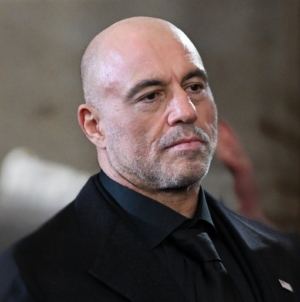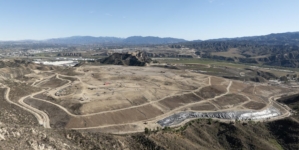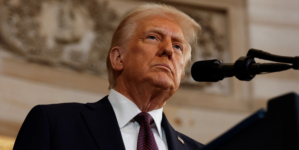-
Joe Rogan Donald Trump Inauguration Ball Photo Takes Off Online - 17 mins ago
-
These 28 hiking trails burned in the Palisades fire - 23 mins ago
-
Deadly Hotel Fire at Turkish Ski Resort Stirs Grief and Outrage - 44 mins ago
-
Donald Trump Told to ‘F*** Off,’ Leave Greenland Alone by Danish Lawmaker - 52 mins ago
-
Altadena reopening reveals devastation — but community still standing - about 1 hour ago
-
How Many Points Did Lakers’ Bronny James Score in Win Over Wizards? - about 1 hour ago
-
Houthis Say They Will Free the Crew of a Cargo Ship They Hijacked 14 Months Ago - about 1 hour ago
-
‘Freaked out’: Fear, uncertainty grip California’s immigrant community as Trump rolls out crackdown plan - 2 hours ago
-
Taylor Swift Breaks Another Major Record - 2 hours ago
-
Opinion | The New Rules of the Trump Era - 2 hours ago
Trump’s order to cut off funding to sanctuary cities could threaten L.A. fire relief
As Los Angeles rebuilds from a devastating wildfire that destroyed swaths of Pacific Palisades, the city’s access to federal money could be imperiled by one of President Trump’s first-day immigration actions targeting “sanctuary cities.”
An executive order that Trump signed Monday, shortly after he was sworn in, directs federal officials to take actions “to ensure that so-called ‘sanctuary’ jurisdictions, which seek to interfere with the lawful exercise of Federal law enforcement operations, do not receive access to Federal funds.”
The order, titled “Protecting the American People Against Invasion,” is one of several the President issued cracking down on immigration, including another directive to end birthright citizenship for children of immigrants in the country temporarily or without authorization. Several states, including California, filed an immediate legal challenge on the grounds that birthright citizenship for any child born in the U.S. is protected by the Constitution.
In November, the Los Angeles City Council approved a sanctuary city law that forbids city employees and resources from being involved in federal immigration enforcement. It was signed into law by Mayor Karen Bass last month.
“Mayor Bass will work with anyone to bring federal resources to our city and will stand against any policy that would harm L.A. families,” Bass spokesperson Zach Seidl said in an email. “Right now, her focus is to work with our federal partners to lead the most monumental recovery effort in history.”
Nick Barnes-Batista, a spokesperson for City Councilmember Hugo Soto-Martínez, said in an email that the city will not lose funding under Trump’s executive order.
L.A.’s sanctuary city law, which Soto-Martínez proposed with two colleagues, “does not interfere with federal law enforcement operations; rather, it ensures that city resources and staff are not used to collaborate with immigration authorities,” Barnes-Batista said. “Simply put, the city of Los Angeles neither obstructs nor assists federal immigration operations.”
The sanctuary city law, first proposed in 2023, codified preexisting policies to protect immigrants and their families that were established under an order by former Mayor Eric Garcetti.
The law says that city employees and property may not be used to “investigate, cite, arrest, hold, transfer or detain any person” for the purpose of immigration enforcement.
Immigrant rights groups in L.A. and other cities have pushed for sanctuary city policies, which limit cooperation with federal officials on immigration enforcement. They are intended to build trust between immigrant communities, police and other government institutions by enabling undocumented people to report crimes and access essential services without fear of deportation.
Trump, who has said that immigrants are “poisoning the blood of our country,” promised “the largest deportation operation in American history,” to use the military to execute it and to ask Congress to pass a law outlawing sanctuary cities nationwide.
Trump has also threatened to withhold firefighting aid to California if its leaders do not carry out his political agenda. House Speaker Mike Johnson and congressional Republicans have said they want to place conditions on providing federal aid to California fire victims, while Trump has suggested using Los Angeles fire relief as a bargaining chip to get Democratic support for his policy and budget priorities.
During a news briefing Tuesday, Trump said that “it’s been, in some ways, made simpler by Los Angeles, because they’re going to need a lot of money, and generally speaking, I think you find that a lot of Democrats are going to be asking for help.”
“Look, we’re going to take care of Los Angeles,” Trump said.
The Palisades fire, which started the morning of Jan. 7, has destroyed more than 6,300 structures and killed 11 people. It was 65% contained as of Tuesday. The Eaton fire, which broke out near Altadena later that day, has destroyed more than 9,400 structures and killed 17 people. It is now 89% contained.
Los Angeles officials emphasized the importance of coordination with federal officials as the city undertakes one of the largest disaster recovery efforts in its history.
“Federal disaster aid is essential — not only for our city’s recovery but also for maintaining the stability and resilience of the entire region,” Councilmember Katy Yaroslavsky, who chairs the budget and finance committee, said in a statement.
Yaroslavsky added that “the federal government has a strong interest in partnering with Los Angeles to ensure the success of this recovery, particularly as we prepare to host global events like the 2028 [Olympic] Games.”
Trump’s actions against immigrants will have outsized impacts in California, and the Los Angeles area in particular as it recovers from the fires.
California has more first-generation immigrants than any other state, and more than 62% of L.A. County’s nearly 10 million residents are either foreign born or have at least one immigrant parent, according to the Pew Research Center. About 800,000 people in L.A. County lacked legal status in 2023, according to the USC Equity Research Institute.
Times staff writers Colleen Shalby and David Zahniser contributed to this report.
Source link


















